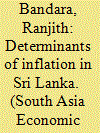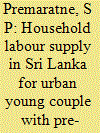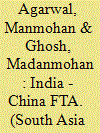| Srl | Item |
| 1 |
ID:
109735


|
|
|
|
|
| Publication |
2011.
|
| Summary/Abstract |
This article empirically estimates a stochastic cost function and thereby estimates local economies of scale and cost-efficiency measures of the public universities in Bangladesh. A flexible quadratic cost function, an unbalanced panel dataset and the maximum likelihood estimation technique have been used in the study. The empirical results show that though the public universities have very high relative efficiency measures, they are scale inefficient.
|
|
|
|
|
|
|
|
|
|
|
|
|
|
|
|
| 2 |
ID:
109743


|
|
|
|
|
| Publication |
2011.
|
| Summary/Abstract |
A high and sustained economic growth in conjunction with low inflation is the central objective of macroeconomic policy formulation in both developed and developing countries. Further, studying inflationary processes is an important issue in the current scenario as it allows policy-makers to achieve monetary and economic targets. However, it is not an easy task, especially in developing coun-tries, where economic processes are highly unstable and volatile. The situation in Sri Lanka is not exceptional. Therefore, understanding the behaviour of inflation is vital for the policy-makers in macroeconomic management as Sri Lanka is currently moving into new era of economic development. This article investigates the determinants of inflation in Sri Lanka during 1993-2008, a period which was characterized by upward and downward trends in the economy. Vector auto-regressive (VAR) models were used to find out appropriate explanations for inflation with accompanied application of Granger Causality Tests. The overall findings of estimated VAR models imply that the money supply, exchange rate and the GDP have information which helps in exploring the behaviour of the inflation in Sri Lanka.
|
|
|
|
|
|
|
|
|
|
|
|
|
|
|
|
| 3 |
ID:
109751


|
|
|
|
|
| Publication |
2011.
|
| Summary/Abstract |
This research note focuses on the labour supply decision in Sri Lanka of parents with the presence of pre-school children. For this study, 200 households with at least one pre-school child were surveyed. Women's non-market time does not depend on their husband's wage; but both housework and child care of other adults-particularly female adults-respond positively to an increase in the wife's labour force participation. The decision to buy formal child care is affected by the age of children, cost of day-care centres, household income, types of occupation and level of education and quality of child care. Quality child-care services increase female labour force participation. Moreover, if child care is more affordable, more mothers would participate in the labour force. Governments can embrace this argument.
|
|
|
|
|
|
|
|
|
|
|
|
|
|
|
|
| 4 |
ID:
109740


|
|
|
|
|
| Publication |
2011.
|
| Summary/Abstract |
In this article I study regional growth and sub-national income convergence in India in the context of economic reforms that have been undertaken since 1991. I also examine convergence in development inputs such as population growth, literacy and investment at the sub-national level. My results show that there is a strong evidence of divergence in per capita income of the 15 states studied in the sample. The standard deviation of net state domestic product has increased over time indicating no evidence of convergence in the pre- or post-reform period. Population, state capital expenditure and commercial bank credit have also diverged over time across these 15 Indian states. However, literacy shows evidence of convergence across states.
|
|
|
|
|
|
|
|
|
|
|
|
|
|
|
|
| 5 |
ID:
109730


|
|
|
| 6 |
ID:
109745


|
|
|
|
|
| Publication |
2011.
|
| Summary/Abstract |
One of the main objectives of the World Trade Organization (WTO) is to facilitate world's trade and production. It enforces legally binding multilateral agreements on trade in goods, services and trade-related aspects of intellectual property rights. The Trade Related Intellectual Property Rights (TRIPs) Agreement was implemented to regulate standards of Intellectual Property (IP) regulations in WTO member countries. Being a member of the WTO and a signatory to the TRIPs Agreement, it was compulsory for Sri Lanka and five other South Asian countries (Bangladesh, Nepal, the Maldives, India and Pakistan) to formulate its IP regulations to comply with the TRIPs Agreement. According to the agreement, by 2006 India, Pakistan and Sri Lanka, and by 2013 Bangladesh and Nepal have to provide legal protection to plant varieties and farmers' traditional knowledge via patents or by an effective sui generis system or by both. All of the above six countries have during the past 15 years implemented or drafted several acts to comply with the TRIPs Agreement. Sri Lanka has passed the Intellectual Property Rights Act No. 36 of 2003 to comply with the TRIPs Agreement. However, this Act does not provide protection for plant varieties and farmers' traditional knowledge as it does not allow patenting of plants. Due to several reasons such as lack of demand from civil society, a poor legal system, lack of properly established institutional system, etc,. Sri Lanka was unable to build an effective intellectual property rights regime complying with the agreement, especially for the agricultural sector. Further, due to a delay in establishing rules and regulations to comply with the agreement, the Sri Lankan agricultural sector faces several difficulties in international trade and it has also lost a number of opportunities to use its own plant varieties for the benefit of future generations. The article suggests several techniques and methods that could be followed in implementing intellectual property rights in agriculture in order to promote investments and accelerate trade especially in Sri Lanka. And also it suggests the importance of having a regional centre to manage intellectual property rights effectively among South Asian countries.
|
|
|
|
|
|
|
|
|
|
|
|
|
|
|
|
| 7 |
ID:
109748


|
|
|